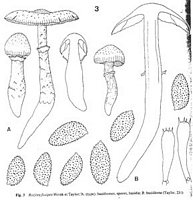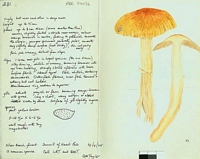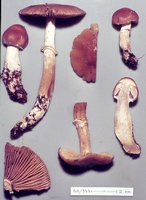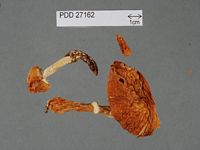|
 Cortinarius elacatipus Cortinarius elacatipus
SynonymsRozites fusipes
BiostatusPresent in region - Indigenous. Non endemic
Images (click to enlarge) | 
Caption: water colour
Owner: G.M. Taylor | 
Caption: ZT68-344 , Holotype
Owner: E. Horak: © Creative Commons Attribution-Noncommercial 3.0 New Zealand | 
Caption: Dried type specimen
Owner: Herb PDD | |
Article: Horak, E.; Taylor, G.M. (1982) [1981]. Fungi Agaricini Novazelandiae. XI. Rozites Karsten. New Zealand Journal of Botany 19(4): 353-360 (http://www.rsnz.org/publish/abstracts.php).
Description: Pileus -80 mm, hemispheric to convex when young becoming expanded with age, centre occasionally depressed around umbo; honey-brown, date-brown or orange-brown when moist, fading with drying; glutinous to viscid, covered with minute, whitish fibrils and squamules from universal veil, hygrophanous, striate towards margin. Lamellae crowded, emarginate (and often decurrent with short teeth), ventricose; pale argillaceous at first, turning to pale rust-brown, edge concolorous, even or subserrate. Stipe -150 x-15 mm, fusoid, tapering towards base, rooting in litter; white, changing to pale yellow-brown or brass-yellow with age, strongly fibrillose; annulus white, indistinctly striate, evanescent; below annulus several incomplete, white, fibrillose bands from universal veil; dry, solid, single, in groups. Context white, brown beneath cuticle and in base of stipe. Odour and taste not distinctive. Chemical reactions on pileus: KOH, HCI - negative. Spore print pale rust-brown. Spores 11-15 x 6-7.5 µm, amygdaliform, verrucose, brown, mucro none. Cheilocystidia not observed Basidia 35-42 x 10-12 µm, 4-spored. Cuticle a cutis of slightly gelatinised, cylindric hyphae (2-4 µm diam.), sub-cutis composed of subglobose or polygonal cells, membranes encrusted with dark brown (KOH) pigment. Clamp connections present.
Habitat: o n soil among litter under Nothofagus: solandri (Hook.f.) Oerst. var. cliffortioides: (Hook.f.) Poole and N. menziesii (Hook.f.) Oerst New Zealand.
Notes: In New Zealand's Nothofagus forests, Routes fusipes fruits preferentially among deep moss in damp localities. The long and tapering stipe makes this species well adapted to such sites. The non-striate annulus of R. fusipes is often ruptured or may fall off, so that in the field the generic identification of this taxon can be difficult.
|